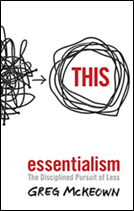
Essentialism: The disciplined pursuit of less
Have you ever found yourself stretched too thin at home or at work?
Have you ever felt both overworked and underutilized?
Do you ever feel busy but not productive?
Do you feel like you are constantly in motion, but never getting anywhere?
If the answers to any of the above are a yes, this book is for you. McKeown draws your attention to these familiar questions and then puts you on a path to seek answers, which lie in the disciplined pursuit of less. Yes! you read it correctly, it is less.
Greg McKeown, meticulously, outlines the path to ‘Essentialism’, which is the answer to the above, and the ability to discern the vital few from the trivial many. With the help of examples, he drives the point that essentialism is a disciplined approach for determining where our highest point of contribution lies, thereby making execution of it almost effortless.
The author starts with a relatable example of the perils of not organising one’s wardrobe. If we do not make a conscious effort to organise our wardrobe, we end up owning clothes we rarely wear. The author equates the wardrobe with life which gets cluttered as we pile up commitments and activities. The book further outlines how an Essentialist would approach the cluttered wardrobe (aka life), via the “Triple Es”, to achieve the highest possible return on every precious moment of our life (or ROCE as we know it in the capital markets)
Before sharing the mantra of “Triple Es”, McKeown emplores us to replace three false assumptions – “I have to”, “it’s all-important” and “I can do both”, with, “I choose to”, only a few things matter” and “I can do anything but not everything”. The essence being (1) we might not have control over our options, but we always have control over our choices (2) working hard is important but working more does not necessarily yield more and (3) tradeoffs.
Triple Es:
Explore and evaluate – instead of asking, “is there a chance I will wear this someday in the future?”, an Essentialist, would ask, “do I love this?” “Do I wear this often?” “Do I look great in this?” In this step an essentialist creates space to explore, observes and listens, prioritises, and finally selects. The author highlights the use of the 90 percent rule – “if it is not a clear Yes, then it is a clear No”.
Eliminate – this is the stage to remove the trivial many. The author wants us to move from pretty clear to really clear. He wants us to have the ability to say “no” firmly, resolutely, and gracefully, to come out of the sunk-cost bias which is to continue to invest time, money, or energy into something we know is a losing proposition.
Execute – this is the stage to work effortlessly on the vital few. An essentialist builds enough buffers, like adding 50% buffer to the amount of time we estimate to complete a task. Other steps include; identifying the “slowest hiker”, focusing on the minimal viable progress, creating a routine and living by it. McKeown concludes this section by making an important remark- “The way of the Essentialist is not just about success; it is about living a life of meaning and purpose.”
As a mother of a two year old, living in fast-paced Mumbai, and working in the dynamic world of capital markets, I often find myself split between career progression and family time. Thus, this read did not come as a chance encounter but rather a conscious attempt of taking charge of life. I am glad to have understood its essence and await the fruits of essentialism.
“Weniger aber besser- Less is better.”
Ritika Behera
May 2021
